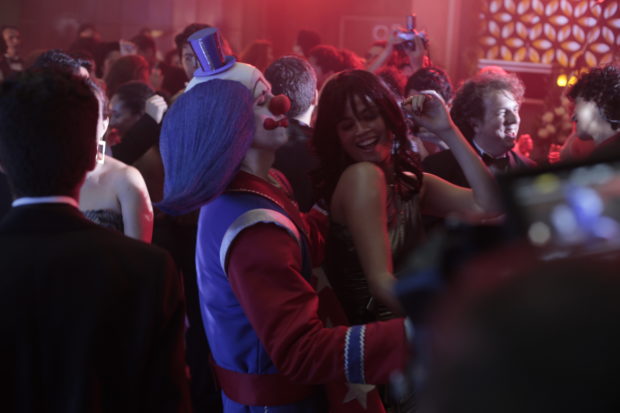You have no items in your cart. Want to get some nice things?
Go shopping
For some, the need to be adored is like water; it’s as vital as oxygen if not more. That is definitely the case for Augusto (Vladimir Brichta), the son of a former theatre, TV and film actress who lost her stature as a diva and has instead become a judge of a dwindling talent show. Bingo – currently Brazil’s submission for next year’s Academy Award for Best Foreign Language Film – charts the extraordinary tale of Augusto’s desperate quest to become a legitimate actor, a quest that takes a decidedly unexpected turn.
As a child in the fifties, Augusto could remember how the public adored his mother. Now, as a grown-up in the eighties, he craves the same adoration himself. He wants the world to know his talent – and he also wants to appear in something that his son Gabriel can see, as opposed to the soft pornographic films he currently stars in. This is where Bingo walks into Augusto’s life. The struggling soft-porn actor finds a new life in the most surprising of quarters: as a clown.
As Bingo the clown, Augusto hosts a children’s morning TV show complete with exaggerated expressions, larger-than-life blue hair and stereotypical clown make-up. The first episode bombs, leading the director, Lúcia, to consider replacing him with a trained clown. In response, Augusto becomes an intern to a clown he meets at the circus. When Augusto stops sticking to the relatively rigid script and starts improvising on the show, Bingo becomes a success.
With the loss of his mother, Augusto’s ability to portray Bingo wanes. This leads to excessive drinking in front of his son, who in turn joins in. Gabriel’s mother, Angelica, is furious: she takes legal action to restrict access to their son until Augusto can prove his sobriety for six months. With the support of Lúcia, he stops drinking and reveals how he misses his mother, his son and the stage – in that order. “Under the spotlight I can be anything I want. I can do everything.” With Lúcia in the audience at her church, Bingo has returned – but this time Augusto reveals himself as the clown.
At first glance, Augusto is an immature and proud man, enjoying the benefits of having a critically acclaimed mother. As we get to know him more, he is revealed to be someone who loves his family deeply but at the same time is addicted to the limelight.
Based on the life story of Arlindo Barreto, an actor who began in soft pornography before moving into soap opera, the most powerful relationship in the film is the relationship Augusto has with women. There is no denying the love, respect and admiration he has for his mother. She was his inspiration and his biggest supporter. He has spent his life wishing to follow in her footsteps at any cost. Her words carried immense weight with him. “We are moths,” goes one of her sayings. “We need the light to survive.”
This relationship is mirrored by his relationship with his director, Lúcia. For much of the film, Augusto enjoys casual relationships with several women. Lúcia, in contrast, is cut from a different cloth: she is a morally upstanding woman with strict religious values. She has ambitions to succeed as a director on an international scale – if anything, similar to the example set by Augusto’s own mother. This parallel becomes especially notable in the light of his mother’s passing.
Bingo is also notable for its powerful portrayal of both the upside and downside of fame. Augusto makes the show a success and can finally call himself an actor, even at times making risky choices such as having a scantily dressed woman dancing provocatively on a children’s show.
On the downside, he is someone that is seduced by attention and needs it in any arena possible. When he can’t share with the world that it is him that plays Bingo, he falls into a spiral of drug abuse and casual sex. When his beloved mother dies, he falls into an even deeper whirlpool of alcoholism and violence. He lets the success of the show go to his head, teasing a competing TV station on live television and missing his son’s birthday party.
Under the debut direction of Daniel Rezende – previously a BAFTA winner and Oscar nominee for his work editing the seminal film City of God – Vladimir Brichta’s performance is creative and raw. Appropriately for a film about a clown, Brichta manages a deft juggling act: he portrays both the comedic hilarity of Bingo and the promiscuous irrelevance of Augusto, all the while delivering a heartfelt portrayal of grief and loneliness, of professional success and personal failure.
Rezende’s ability to deliver the backstage view of ’80s Brazilian television is eye-opening to say the least. Its surrealism is insightful to anyone interested in, or on the cusp of, the world of television or cinema production. At the same time, it tells an essential, primitive story: that of father and son. In his quest to be recognised as an actor in a production that his son can watch, Augusto risks his relationship with Gabriel. After all, he makes countless children laugh everyday, but not his own.
Bingo is currently in UK cinemas.

About B.L. Sherrington
B. L. Sherrington is an aspiring novelist. In between writing short stories and reviews, Sherrington is penning a science fiction/fantasy novel and co-writing a play. An experienced journalist, Sherrington has previously written for Neon, The Metropolist, DEUX HOMMES and SANT Magazine. Previously a student at Manchester Metropolitan University, Sherrington is preparing to return to education at the Open University to study Creative Writing.




